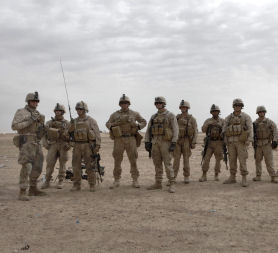Will Cameron learn the Afghanistan intervention lesson?
As a Government report suggests victory in Afghanistan is far from secure, Gaby Hinsliff asks whether David Cameron will learn the lessons on military intervention in Libya from his predecessors.

Tony Blair called it “the loneliness of the decision-maker”, the sombre and ultimately solitary judgement call over whether to send troops into military action.
This week, David Cameron faced the same rite of passage over Libya. What lessons can he learn from his predecessor’s controversial exercises in liberal interventionism?
A report published in Parliament turns the spotlight back onto a war largely overshadowed by recent events in the Middle East. Four months before the US is due to begin the slow withdrawal of troops from Afghanistan, with some British troops likely to return this year too, the Conservative-chaired Foreign Affairs Select Committee warns victory is far from secure.
Read more: Channel 4 News Special Reports on Afghanistan and the Middle East uprisings
It concludes the military surge is “not succeeding”, success in Helmand is overhyped, and the US is not focussing sufficiently on a postwar political process. Most damningly, it argues the military effort expended may not correlate with the stated aim of protecting British national security, while the allies’ aims may be unachievable. Was the war in vain?
How much moral responsibility do we wish to take for victims of repressive regimes?
Some political definition of what “winning” this ambiguous war means is urgently needed before the summer. Was it just about subduing al-Qaeda – which the select committee thinks may have been achieved, although ministers say intelligence suggests otherwise? Or establishing a stable, peaceful democracy?
President Obama, who has invested much personal credibility in the surge, is expected to set out his thinking on Afghanistan’s future later this month.
David Cameron has less personally at stake, since voters tend to regard this as Blair’s war rather than his. But he needs to tackle any suggestion of Britain cutting and running. Being seen to retreat from confronting Islamic fundamentalism has not only long-term security implications, but could send immediate signals to the rival political movements jostling to succeed the Middle East’s tumbling despots.
Taken together, these old and new Middle East crises pose broader questions too. Is the Shadow Defence Secretary Jim Murphy right that Iraq and Afghanistan have turned the public off interventionism? How much moral responsibility do we wish to take for victims of repressive regimes, amid defence cutbacks? Is military force or “soft power” the right response to a changing Arab world?
The committee’s call for a public inquiry on Afghanistan will probably fall on deaf ears. But Cameron should heed their recommendation to clarify the ground rules for multinational military action – preferably before it happens again.
Gaby Hinsliff is the former Political Editor of the Observer